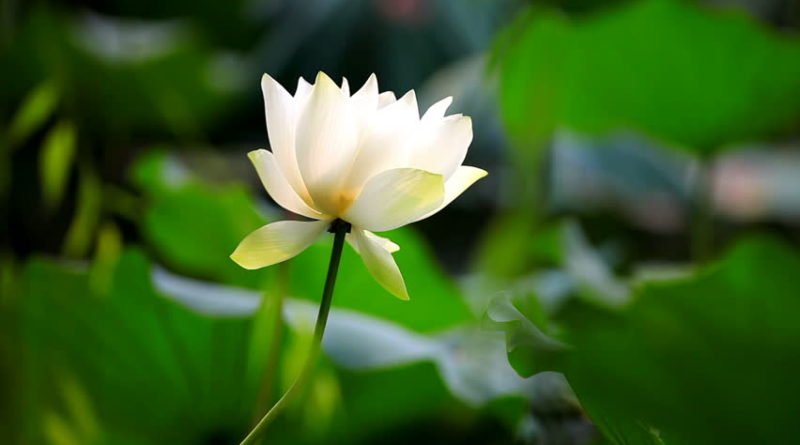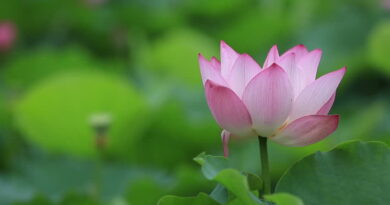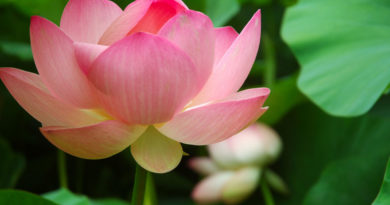Mahāhatthipadopamasuttaṃ – The Major Disourse On The Simile Of The Elephant’s Footprint
Majjhima Nikāya I.
1. 3. 8. Mahāhatthipadopamasuttaṃ
(28) The Major Disourse on the Simile of the Elephant’s Footprint
I heard thus.
At one time the Blessed One lived in the monastery offered by Anāthapiṅḍika in Jeta’s grove in Sāvatthi. Then, venerable Sāriputta addressed the bhikkhus “Friends, bhikkhus, just as the foot prints of all moving things get included in the footprint of the elephant and it becomes the biggest. Just so all things of merit get included in the four noble truths. What four? The noble truth of unpleasantness, the noble truth of its arising, the noble truth of its cessation, and the noble truth of the path, to the cessation of unpleasantness.
Friends, what is the noble truth of unpleasantness. Birth is unpleasant, decay, death, grief, lament, displeasure and distress are also unpleasant. Not to get one’s desires is unpleasant, in short the five holding masses are unpleasant. Friends, bhikkhus, what are the five holding masses? They are the holding mass of matter, the holding mass of feelings, the holding mass of perceptions, the holding mass of determinations and the holding mass of consciousness? Friends, what is the holding mass of matter: The four primary elements and the held on body from the four primary elements is the holding mass of matter. What are the four primary elements: Earth, water, fire and air are the four primary elements.
Friends, what is the earth element: There is internal earth element and external earth element. What is internal earth element. Whatever hard rough matter internally held as mine, such as hair of head and body, nails, teeth skin, flesh, nerves, bones, bone marrow, kidneys, heart, liver pleura, lungs lower intestines, bowels, belly, excreta, and any other hard, rough internally held matter, all that is internal matter. All this internal earth element, and external earth element, go as earth element. That is not mine, am not that, it is not my self. This should be known as it really is, with right wisdom. Seeing this, as it really is, with right wisdom, the mind should be detached from the earth element, There comes a time when the external water element is agitated, at that time the external earth element is closed up, in it . That shows the agedness and impermanence of the earth element. So why hold on to this body of three hundred bones as this is mine, am that, it is my self. Again others ṃay revile, blame, arouse and distress the bhikkhu. Then he knows, these unpleasant feelings arise with a cause. What is the cause? Contact is the cause He reflects that contact is impermanent, feelings are impermanent, that perception is impermanent, determinations are impermanent, and that consciousness is impermanent. His mind springs forward with the sign and elements, is pleased, settled, and released. [1] Others may treat that same bhikkhu in disagreeable, unwelcome, unkind ways, with the contact of hands, clods, sticks, and weapons. Then he knows, this body should be such, that it endures the contact of hands, clods, sticks and weapons.
In the Simile of the saw the Blessed One said, even if robbers and bandits cut limb after limb with a two handled saw, if the mind is defiled on account of that, he has not done the duty in my dispensation. It will be, my effort will be aroused repeatedly, unconfused mindfulness established, the body appeased without anger, the mind concentrated, in one point. Let the body now endure, the contact of hands, clods, sticks and weapons. Thus the dispensation of the Enlightened Ones is done. If the mind of the bhikkhu who reflects the Enlightened One, the Teaching, and the Community of bhikkhus thus, does not settle in merit with equanimity, he should be remorseful . It is a loss for me, I have missed a rare chance, that my mind did not settle in merit with equanimity. Like the daughter -in-law who has seen the mother-in-law would be remorseful. In the same manner the bhikkhu reflecting the Enlightened One, the Teaching and the Community of bhikkhus, if the mind does not settle in merit with equanimity, he should be remorseful. It is loss for me, I have missed a rare chance, that my mind did not settle in merit with equanimity.
Friends, if the mind of the bhikkhu reflecting the Enlightened One, the Teaching, and the Community of bhikkhus settles in merit with equanimity, he should be delighted. The bhikkhu who has done this much, has done a lot.
Friends, what is the water element. There is internal water element and external water element. What is the internal water element. Whatever internal personal water, held as bile, phlegm, pus, blood, sweat and oil of the skin, tears and oil of the eye, spit and snot, synovial fluid and urine, whatever any other held cohesiveness is the internal water element. This internal water element and the external water element, all go as water element. That is not mine, am not that, its not my self. This should be seen with right wisdom, as it really is. Thus seeing it with right wisdom, as it really is, the mind should be detached from the water element. There’s a time when the external water element agitates, it overflows villages and hamlets, towns and states, and the whole state. There is a time when the water in the ocean recedes as far as seven hundred miles, one thousand four hundred miles, two thousand one hundred miles, two thousand eight hundred miles, three thousand five hundred miles, four thousand two hundred miles, and recedes four thousand nine hundred miles. Friends, there is a time when the water in the ocean stands up to seven palms, six palms, five palms, four palms, three palms, two palms, a single palm. There’s a time when the water in the ocean stands up to the height of seven men, six men, five men, four men, three men, two men, one man. It stands up to the height of half a man, stands only waist deep, only knee deep, only up to the ankle. There is a time when the water in the ocean is not enough to wet the toes. This, is evidence of the agedness and impermanence of the external water element. So why hold on to this body of three hundred bones? As this is mine, am that, it’s my self. Again, others ṃay revile, blame, arouse and distress the bhikkhu. Then he knows, these unpleasant feelings arise with a cause. What is the cause? Contact is the cause. He reflects that contact, those feelings, those perceptions those determinations and that consciousness is impermanent. His mind springs forward with the sign and elements, is pleased, settled, and released. (1) Others may treat that same bhikkhu in disagreeable, unwelcome, unkind ways, with the contact of hands, clods, sticks, and weapons. Then he knows, this body should be such, that it endures the contact of hands, clods, sticks, and weapons. In the Simile of the saw it has been said by the Blessed One. Even if robbers and bandits cut limb after limb with a two handled saw, if the mind is defiled on account of that, he has not done the duty in my dispensation. It will be, my effort will be aroused repeatedly, unconfused mindfulness established. The body appeased and without anger. The mind concentrated will be in one point. Let the body now endure, the contact of hands, clods, sticks and weapons. The dispensation of the Enlightened Ones is done. If the mind of the bhikkhu who reflects the Enlightened One, the Teaching, and the Community of bhikkhus thus, does not settle in merit with equanimity, he should be remorseful. It is a loss for me, I have missed a rare chance, that my mind did not settle in merit with equanimity. Like the daughter -in-law who has seen the mother-in-law would be remorseful. In the same manner if the mind of the bhikkhu reflecting the Enlightened One, the Teaching and the Community of bhikkhus does not settle in merit with equanimity, he should be remorseful. It is loss for me, I have missed a rare chance. That my mind did not settle in merit with equanimity Friends, if the mind of the bhikkhu reflecting the Enlightened One, the Teaching, and the Community of bhikkhus, settles in merit with equanimity, he should be delighted. The bhikkhu who has done this much has done a lot.
Friends, what is the fire element. There is internal and external fire element What is internal fire element? Whatever internal personal heat, the burning that causes decay, the digestion of whatever is enjoyed eaten and tasted. The internal fire held as mine, and any other firey thing that is internal is internal fire element. The internal fire element and the external fire element go as fire element. That is not mine, I’m not that, it’s not my self. This should be known as it really is, with right wisdom. Thus the mind should be detached from the fire element. There is a time when the fire element agitates villages and hamlets, towns and states, and complete states. It comes to the end of the green, end of the forest, to the coast, to the water’s end, or to some pleasant stretch of land and extinguishes, owing to lack of fuel. There is a time when fire originates in the stem of a cock’s feather or in a lump of veins.
That’s evidence of the agedness and impermanence of the external fire element So why hold this body of three hundred bones as this is mine, I’m that, it’s my self? Again, others ṃay revile, blame, arouse and distress the bhikkhu. Then he knows, these unpleasant feelings have arisen to me with a cause. What’s the cause? Contact is the cause He reflects, contact is impermanent, feelings, perceptions and determinations are impermanent, and consciousness is impermanent. His mind springs forward with the sign and elements, is pleased, settled, and released. (1) Others may treat that same bhikkhu in disagreeable, unwelcome, unkind ways, with the contact of hands, clods, sticks, and weapons. Then he knows, this body should be such, that it endures the contact of hands, clods, sticks and weapons. In the Simile of the saw it has been said by the Blessed. Even when robbers and bandits cut limb after limb with a two handled saw, if the mind of the bhikkhu is defiled he has not done the duties in my dispensation. It will be my effort will be aroused repeatedly, unconfused mindfulness established, the body appeased without anger, the mind concentrated in one point. Let the body now endure, the contact of hands, clods, sticks and weapons. thus the dispensation of the Enlightened Ones is done. If the mind of the bhikkhu who reflects the Enlightened One, the Teaching, and the Community thus, does not settle in merit with equanimity, he should be remorseful. It is a loss for me, I have missed a rare chance. That my mind did not settle in merit with equanimity. Like the daughter -in-law who has seen the mother-in-law would be remorseful, in the same manner if the mind of the bhikkhu reflecting the Enlightened One, the Teaching and the Community of bhikkhus does not settle in merit with equanimity, he should be remorseful. It is loss for me, I have missed a rare chance. That my mind did not settle in merit with equanimity. Friends, if the mind of the bhikkhu reflecting the Enlightened One, the Teaching, and the Community of bhikkhus settles in merit with equanimity, he should be delighted. The bhikkhu who has done this much has done a lot.
Friends, what is the air element. There is internal air element and external air element. What is internal air element The internal personal airiness that is held, as up going winds, down going winds, winds in the stomach and bowels. Winds going up and down limbs, in-breaths and out-breaths and any other airiness held as mine, is internal air element. This internal and external air element goes as air element. That is not mine, am not that, it’s not my self. This should be seen with right wisdom, as it really is and the mind should be detached from the air element.
Friends, there is a time when the external air element is agitated and it wields power over village and hamlet, town and state and over the complete state. In the last months of the Summer there is a time when the wind has to be sought by fanning. Then water does not flow and blades of grass do not move. That is evidence of agedness and, impermanence of the external air element. So why hold to this body of three hundred bones as this is mine, I’m that, it’s my self? Again, others ṃay revile, blame, arouse and distress the bhikkhu, then he knows. These unpleasant feelings arise with a cause. What is the cause? Contact is the cause. He reflects contact is impermanent, feelings, perceptions and determinations are impermanent, and consciousness is impermanent. His mind springs forward with the sign and elements, is pleased, settled, and released. (1) Others may treat that same bhikkhu in disagreeable, unwelcome, unkind ways, with the contact of hands, clods, sticks and weapons. Then he knows, this body should be such, that it endures the contact of hands, clods, sticks and weapons. In the Simile of the saw, the Blessed One has said, when robbers and bandits cut limb after limb with a two handled saw, if the mind is defiled on account of it, he has not done the duty in my dispensation. It should be, my effort will be aroused repeatedly, unconfused mindfulness established, the body appeased without anger and the mind concentrated in one point. Let the body now endure, the contact of hands, clods, sticks and weapons. Thus the dispensation of the Enlightened Ones is done. When the bhikkhu reflects the Enlightened One, the Teaching, and the Community of bhikkhus thus, if the mind does not settle in merit with equanimity, he should be remorseful on account of it. It is a loss for me, I have missed a rare chance. That my mind did not settle in merit with equanimity. Like the daughter -in-law who has seen the mother-in-law would be remorseful. In the same manner if the mind of the bhikkhu reflecting the Enlightened One, the Teaching and the Community of bhikkhus, does not settle in merit with equanimity, he should be remorseful. It is loss for me, I have missed a rare chance. That my mind did not settle in merit with equanimity. Friends, when the bhikkhu reflected the Enlightened One, the Teaching, and the Community of bhikkhus if the mind settled in merit with equanimity, he should be delighted. The bhikkhu who has done this much has done a lot.
Friends, an enclosure made in space with sticks, creepers, grass, and mud is a house likewise an enclosure made out of bones, nerves and flesh is matter. When the internal eye is unimpaired, external forms do not come to the purview, with the complementary coming together, the respective consciousness does not arise When the internal eye is unimpaired, external forms come to the purview, without the complementary coming together, the respective consciousness does not arise. When the internal eye is unimpaired, external forms come to the purview, with the complementary coming together, the respective consciousness arises. Whatever matter arises there from, goes to the holding mass of matter. Feelings to the holding mass of feelings. Perceptions to the holding mass of perceptions. Determinations to the holding mass of determinations and whatever consciousness goes to the holding mass of consciousness. It is in this manner, that the five holding masses accumulate, come together and momentarily behave together). The Blessed One has said, he who sees dependent arising, sees the Teaching, He who sees the Teaching sees dependent arising. [2] Indeed these five holding masses arise dependently. The interest, settlement, follow up and the appropriation in the five holding masses is the arising of unpleasantness. [3] Dispelling the interest and greed for the five holding masses, is the cessation of unpleasantness. [4] When this is done, the bhikkhu has done much. When the internal ear is unimpaired-the nose is unimpaired, –the tongue is unimpaired, –the body is unimpaired, When the mind is unimpaired, external ideas do not come to the purview, with the complementary coming together the respective consciousness does not arise. When the mind is unimpaired, external ideas come to the purview, without the complementary coming together, the respective consciousness does not arise. When the mind is unimpaired, external ideas come to the purview, and with the complementary coming together the respective consciousness arises. Whatever matter produced there, goes to the holding mass of matter. Feelings, to the holding mass of feelings. Perceptions, to the holding mass of perceptions. Determinations, to the holding mass of determinations. Consciousness to the holding mass of consciousness. It is in this manner, that the five holding masses accumulate, come together and momentarily behave together. The Blessed One has said, he who sees dependent arising. sees the Teaching. He who sees the Teaching sees dependent arising. Indeed these five holding masses arise dependently. The interest, settlement, follow up and the appropriation in the five holding masses is the arising of unpleasantness. Dispelling the interest and greed for the five holding masses, is the cessation of unpleasantness, The bhikkhu who has done this much has done a lot.
Venerable Sāriputta said thus and those bhikkhus delighted in the words of venerable Sāriputta,
Notes.
[1] His mind springs forward with the sign and elements, is pleased settled and released (tassa dhātārammanaṃ eva cittaṃ pakkhandati pasīdati santitiṭṭhati). This springing of the mind is always for a change in the mind, it causes a feeling to arise. Here the bhikkhu has overcome a disagreeable feeling becomes pleased, gets settled and finds release of the mind, instead of being disagreeable and averse to that situation and feeling. This is a development to the bhikkhu. Several such developments and growths should come to the bhikkhu in his development up to arahanta. The sign is the thought, or attention and the elements are the things that mattered at one or the other sense door. i.e., a sight, a sound, etc.
[2] He who sees dependent arising sees the Teaching. He who sees the Teaching sees dependent arising (yo paticcasamuppādaṃ passati, so dhammaṃ passati. Yo dhammaṃ passati so patticcasamuppādaṃ passati). This reciprocal statement tells us that we have to understand dependent arising to understand the Teaching. Dependent arising means anyone born, is subject to decay, ailments, death, grief, lament and unpleasantness. There are some other ways of explaining Dependent Arising. Here it is necessary that we remove the cause; birth. It is not an easy task to remove the intention ‘to be’.
[3] The interest, settlement, follow up and the appropriation in the five holding masses is the arising of unpleasantness (yo emesu pancupādānaskandesu chando ālayo anusayo ajjhosānaṃ, so dukkhasamudayo). Thus we see that the interested following up of material things external and internal and thinking they are mine is the holding mass of matter, and is the arising of unpleasantness. The interested following up of feelings external and internal and thinking they are mine is the holding mass of feelings, which is the arising of unpleasantness. External feelings are born on account of contact at the six doors of mental contact, and internal feelings are born when the idea gets ingrained that the feeling is mine. The interested following up of perceptions thinking they are mine is the holding mass of perceptions, and this too is the arising of unpleasāntness. Perceptions are born on account of contacts at one or other of the doors of mental contact. Or they may be born in imagination. The interested following up of determinations, thinking they are mine is the holding mass of determinations, this is the arising of unpleasantness. The interested following up of consciousness through one or the other of the doors orf mentality is the holding mass of consciousness, this is also unpleasant.
[4] Dispelling the interest and greed for the five holding masses is the cessation of unpleasantness. This is a very slow and tedious process which has to be done with care and attention.







